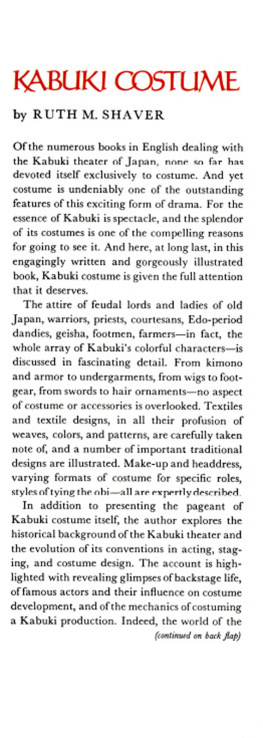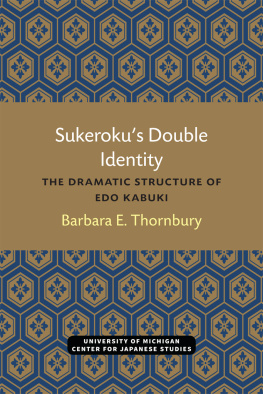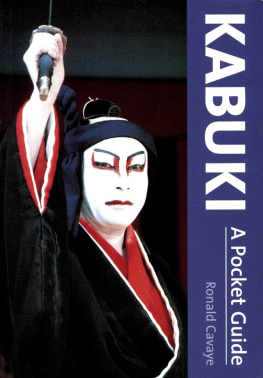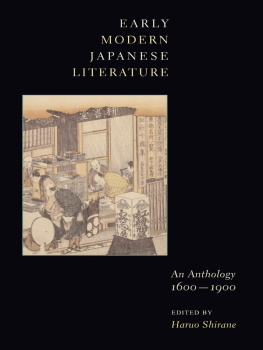K ABUKI D RAMA
Kabuki is the most popular form of Japanese traditional theatre. More fast-moving than Noh, it is a colourful and exciting spectacle based around traditional, historical and mythic narratives, many of which involve the code of the samurai. A recurrent theme is the ethical ideal of the samurai who gives up his life for his lord and his country, and the actors who take on the roles of handsome young samurai enjoy large and enthusiastic followings. Kabuki plays are set in the feudal samurai era, and the actors wear dramatic makeup and costumes and engage in wonderfully choreographed swordplay. A feature of traditional Kabuki is that all the female roles are played by men known as onnagata. Contents include How to Appreciate the Kabuki; Characteristics of the Kabuki; Machinery Peculiar to the Kabuki Stage; Principal Kabuki Plays; Technique Peculiar to the Kabuki; Symbolism and Impressionism in the Kabuki and The Story Value of the Kabuki. This is a fine brief introduction to a highly enjoyable art form.
www.keganpaul.com
THE KEGAN PAUL
JAPANESE TOURIST LIBRARY
Floral Art of Japan Issotei Nishikawa
Japanese Noh Plays Toyoitiro Nogami
Odori Kasyo Matida
Kabuki Drama Syutaro Miyake
YANONE, ONE OF EIGHTEEN BEST PLAYS
By Kiyomitu Torii
First published in 2005 by
Kegan Paul Limited
UK: P.O. Box 256, London WC1B 3SW, England
Tel: 020 7580 5511 Fax: 020 7436 0899
E-Mail:
Internet: http://www.keganpaul.com
USA: 61 West 62nd Street, New York, NY 10023
Tel: (212) 459 0600 Fax: (212) 459 3678
Internet: http://www.columbia.edu/cu/cup
BAHRAIN:
Distributed by:
Marston Book Services Ltd
160 Milton Park
Abingdon
Oxfordshire OX14 4SD
United Kingdom
Tel: (01235) 465500 Fax: (01235) 465555
Email:
Columbia University Press
61 West 62nd Street, New York, NY 10023
Tel: (212) 459 0600 Fax: (212) 459 3678
Internet: http://www.columbia.edu/cu/cup
Kegan Paul, 2005
All rights reserved. No part of this book may be reprinted or reproduced or utilised in any form or by any electric, mechanical or other means, now known or hereafter invented, including photocopying or recording, or in any information storage or retrieval system, without permission in writing from the publishers.
ISBN: 0-7103-1020-X
British Library Cataloguing in Publication Data
Miyake, Syutaro
Kabuki drama. (Japanese Tourist Library)
1. Kabuki
I. Title
792' .0952
ISBN 071031020X
Editorial Note
It is a common desire among tourists to learn something of the culture of the countries they visit, as well as to see their beautiful scenery. To see is naturally easier than to learn, but flying visits merely for sightseeing furnish neither the time nor opportunity for more than a passing acquaintance with the culture of any foreign people. This is specially true of Japan and her people.
The Board of Tourist Industry recognizes both the obligation and the difficulty of providing foreign tourists with accurate information regarding the various phases of Japans culture. It is, therefore, endeavouring to meet this obligation, as far as possible, by publishing this series of brochures.
The present-series will, when completed, consist of more than a hundred volumes, each dealing with a different subject, but all co-ordinated. By studying the entire series, the foreign student of Japan will gain an adequate knowledge of the unique culture that has evolved in this country through the ages.
Board of Tourist Industry,
Japanese Government Railways.
Note
The Japanese Government has adopted a new system of spelling for certain Romanized Japanese syllable sounds. Though the spelling has been modified, the pronunciation remains the same. The modified spelling is given below with the old phonetic spelling in brackets:
Naturally, the change has caused the spelling of certain familiar names of places and things to be altered, for instance:
| Old Spelling | New Spelling |
Shi nto shrine | Si nto shrine |
Chi on-in temple | Ti on-in temple |
Mt. Fuji | Mt. Huzi |
Cha noyu | Tya noyu |
Cho sen | Tyo sen |
Jujutsu | Zyuzyu tu |
Jinrikisha | Zinrikisya |
CONTENTS
An Analysis of the KabukiA Land of Dreams DaikonIts Power of Expression.
Female RlesTheir Noted PlayersHigh-born Daughters Courtesans.
CurtainsHanamitiThe Revolving StageKiTyoboGezaDebayasiKurogo
The Eighteen Best PlaysAragotoClassical PlaysSewamonoKizewamono
Seppuku (Harakiri)The Dumb ShowKorosiMitiyukiTatimawariMonogatariInspection of the HeadVendetta.
The Black CurtainYabudatamiNamiitaThe Story of Rice.
SukerokuKumagais CampKanpei
I. How to Appreciate the Kabuki
What is Kabuki?
An answer for the uninitiated may be supplied by the study of the etymology of the word itself, which shows that Kabuki is a type of acting based on the arts of singing and dancing. It will thus be seen that Kabuki is not acting, pure and simple; it is fundamentally different from Western drama.
In Kabuki the play, singing and dancing, occurs during the course of the development of a story characterized by dramatic elements, and the whole performance is executed as a highly refined art. To be exact the Kabuki may be described as a play more like a revue than a drama, in the European sensea play in which a classical story is enlivened with spectacular scenes.
The Kabuki is a classical play for the masses and rich in artistic qualities. It naturally follows that the Kabuki is presented in large theatres, and not, as with modern plays of the West, in a small theatre intended to serve the sole purpose of art for its own sake.
Moreover, the Kabuki is a very complicated dramatic form. A Kabuki play contains material not in accordance with reason, and its classic style is but a feeble excuse. Foreigners seeing a Kabuki play for the first time invariably think it is wonderful. And wonderful is a fitting epithet for the irrational element in Kabuki. So a theatre built with the principles of modern stage science in mind is far from appropriate for the presentation of a Kabuki play. For a full appreciation of the Kabuki, therefore, one must prepare oneself, before entering the play-house, for a trip to a land of dreamsto a land of poetic vision. Ones mind should be prepared to receive the poetic and the beautiful.
Modern common sense, scientific analysis, logical reasoning, and rational examinationall should be forgotten for the nonce by a spectator of a Kabuki play. One might as well climb a tree in quest of fish as to expect logic and rationality in a Kabuki play.









